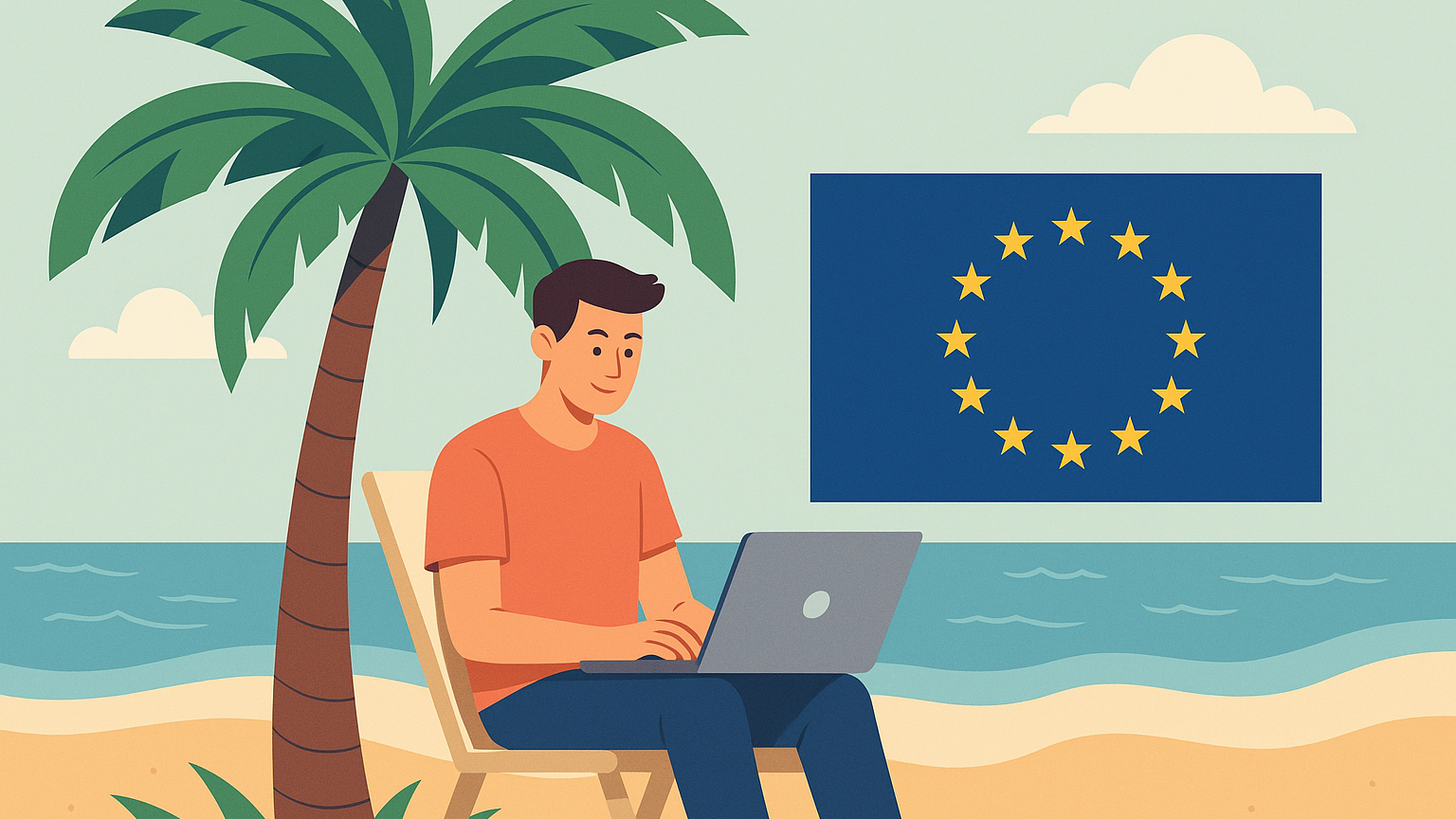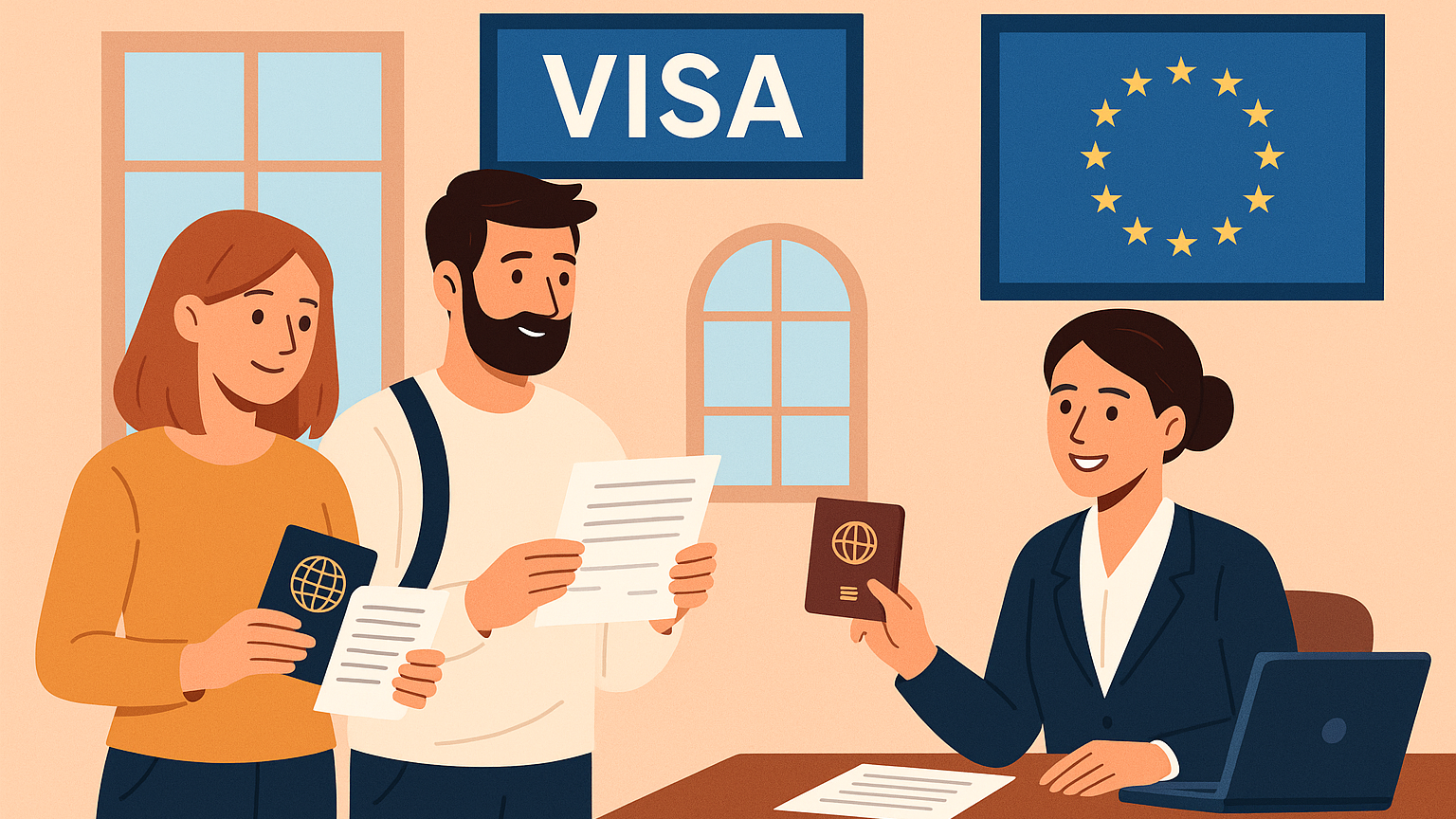Why the digital nomad visa matters for Europeans
Remote work has allowed professionals from Europe to live abroad without sacrificing their careers. A digital nomad visa is a permit that lets you reside in another country while working online. Many Europeans use this visa to enjoy a lower cost of living, better weather and new cultural experiences. Brazil, for example, offers a visa that lasts for one year and can be renewed.
Overview of Brazil’s digital nomad visa
Brazil’s Vitem XIV visa is designed for remote workers. It permits foreigners to live in Brazil for up to 12 months while working for a company abroad. Applicants must prove they have a remote job or run a business outside Brazil and that they have sufficient income to support themselves.
Although citizens from Europe can travel to Brazil visa‑free for up to 90 days, those planning longer stays must submit a remote worker visa process. The visa is attractive because the expenses are modest and the submission process is clear. The consular fee is about €120 (≈ R$ 762.80 or US$ 139.43), and processing generally takes five working days. You will also need to register with the Federal Police within 90 days of arrival.
Eligibility requirements and mandatory documents
Before starting your procedure, make sure you meet the eligibility criteria. To qualify for Brazil’s remote worker visa, you must:
- Be a foreigner working for a company or clients outside Brazil.
- Demonstrate sufficient income to support yourself.
- Hold a valid passport with at least two blank pages.
- Provide a recent photograph.
- Submit a criminal record certificate.
- Show proof of health insurance.
All documents must be originals; copies are not accepted. Europeans may need to obtain an apostille and translation for each document. Prepare your bank statements or contracts to show that you earn at least US$ 1,500 per month or have savings of US$ 18,000. If you plan to bring family members, include marriage and birth certificates. Completing the form thoroughly reduces the risk of delays.
Step‑by‑step visa process process process
Step 1: Prepare your documents
The first stage of the procedure is gathering all required paperwork. Europeans must secure a criminal record certificate from their country of residence. If you live in Finland or another EU member state, request the certificate and ensure it includes your city of birth. In some countries, digital copies are not accepted, so obtain a paper version with an ink stamp. Have each document apostilled or legalized, then translated into Portuguese if necessary. Collect bank statements showing your income, a signed employment contract and proof of health insurance. These documents confirm that you meet the criteria for the remote permit.
Step 2: Complete the online form
Next, go to the Brazilian Ministry of Foreign Affairs website and fill out the online remote visa submission process. Upload scans of all documents, then print and sign the form. Send the signed form and your originals by mail or submit them at the nearest Brazilian consulate. For Europeans, consulates are located in major cities across the continent, such as Lisbon, Madrid, Berlin and Helsinki. The consulate will review your online process for completeness. Incomplete applications are returned, causing delays. When your documents are accepted, the consulate will send payment instructions for the fee. Pay the fee promptly to avoid prolonging the process.
Step 3: Receive your visa and travel
Processing your application typically takes up to five working days, but busy periods may extend this timeframe. Once approved, you will receive your passport with the visa stamp. Before traveling, book accommodation and purchase health insurance if you haven’t already. Upon arrival in Brazil, register with the Federal Police within 90 days. This registration requires the same documents you used in your application. You will receive a Brazilian tax number (CPF), which you need to open a bank account and sign contracts. Failure to register on time can result in fines. Keep copies of all documents; you may need them when extending your location‑independent visa.

Understanding visa costs and budgeting
The costs of applying for a remote work visa are only part of the overall expenses. You must also consider living costs. In Rio de Janeiro, a single person’s monthly expenses (excluding rent) average around R$ 3,258 (US$ 596, €513). Rent for a one‑bedroom apartment in the city center is about R$ 2,500 (US$ 460, €396). A meal at an inexpensive restaurant costs roughly R$ 40 (US$ 7.36, €6.31).
Public transport passes are affordable at about R$ 190 per month (US$ 35, €30). Comparing these costs with those in European capitals highlights Brazil’s affordability. The €120 consular fee (≈ R$ 762.80 or US$ 139.43) is a one‑time expense. You should budget for translation fees, document apostilles, health insurance (around R$ 500 per month) and an emergency fund. Exchange rates fluctuate, but as of August 2025, 1 USD ≈ R$ 5.4709 and 1 EUR ≈ R$ 6.3567. Having a local bank account helps you avoid currency conversion fees.
Comparing international digital nomad visa costs
Other countries offer remote work visas with varying fees and income requirements, but Brazil remains one of the most affordable options for Europeans.

Life in Brazil: climate, culture and community
Brazil offers a tropical climate that appeals to many Europeans. Average summer temperatures in Rio de Janeiro reach 31 °C (88 °F) with lows of 24 °C (75 °F), while winter highs are around 25 °C (77 °F)timeanddate.com. Coastal cities like Florianópolis, Salvador and Recife provide warm weather and beachfront lifestyles year‑round. When planning your application, consider the climate and how it affects your living costs.
Air conditioning can increase your electricity bill, while cooler months may reduce energy usage. Social life is vibrant; Brazilians are known for their friendliness and hospitality. Join coworking spaces, language exchanges and social networks to meet locals and fellow digital nomads. Membership fees at coworking spaces range from R$ 500–800 (US$ 92–147, €79–126) per month.
Learning Portuguese will improve your daily experience. Although many Brazilians speak English, especially in tourist areas, making an effort to speak Portuguese shows respect for the culture. Food costs are low; a cappuccino costs about R$ 7.73 (US$ 1.42, €1.22). Street markets offer fresh fruits and vegetables at low prices. Public transportation is efficient in major cities, and taxi and ride‑share services are affordable. When exploring Brazil’s cities and natural wonders, carry copies of your digital nomad visa and passport. Keep track of your days in the country to manage tax obligations.
Taxes and legal considerations
Brazil’s tax rules may affect Europeans who stay longer than 183 days in a 12‑month period. Once you become a tax resident, you are taxed on worldwide income at rates between 7.5 % and 27.5 %. Because the European Union does not have a single tax treaty with Brazil, consult a tax adviser in your home country to understand how taxes on foreign income will apply.
To avoid double taxation, some Europeans limit their stay to fewer than 183 days or maintain tax residency in their home country. Keep detailed records of travel dates and income. Health insurance is another legal requirement; you must have coverage valid in Brazil.. Plans offering repatriation and comprehensive coverage are recommended. The application requires proof of insurance, and you should maintain your policy throughout your stay.
Tips for a successful digital nomad experience
- Start your application early: Gather documents and submit it several months before your planned departure.
- Budget carefully: Calculate visa fees, translation costs, living costs and emergency funds.
- Learn Portuguese: Language skills enhance your social and professional interactions.
- Respect regulations: Register with the Federal Police within 90 days of arrival. and abide by tax rules.
- Network with others: Join online communities for Europeans using digital nomad visas to share advice about the application process and local life.
- Stay flexible: Processing times may vary, so avoid booking non‑refundable travel until your visa is approved.

European communities and frequently asked questions
Many Europeans thrive when they share experiences with people who have similar goals. In Brazil, cities like Rio de Janeiro, São Paulo and Florianópolis host growing communities who hold a digital nomad visa. They gather in coworking spaces, cafés and social clubs to discuss the process, living costs and travel tips. For example, in Rio’s Ipanema district, you will find cafés where Europeans work remotely and swap advice about the process and their experiences. Coworking spaces such as Impact Hub and WeWork frequently host workshops about the application requirements. These events help newcomers understand the costs of document apostilles, translations and health insurance.
Joining online forums and social media groups dedicated to Brazil’s digital nomad visa is another way for Europeans to get support. Members share recent success stories, warn about common mistakes in the application, and discuss evolving rules. For instance, some people have noted that visa fees may change; staying informed ensures you budget the right costs. Others share which consulates provide faster processing times. People often ask if they can work for Brazilian clients while holding a digital nomad visa; the answer is no, because the visa is only valid for remote employment outside Brazil.. Understanding these rules protects you from legal issues.
Frequently asked questions
Do Europeans need a digital nomad visa for short stays in Brazil? EU citizens can enter Brazil without a visa for up to 90 days. However, if you will be working remotely and staying longer, you must apply for a digital nomad visa. Working while on a tourist visa can lead to fines or deportation. The this visa legalizes your stay and ensures you can access services such as renting accommodation and opening bank accounts.
How long does the application take? Once the consulate has all your documents and the fee, processing usually takes up to five working days. Some reports that their process took longer due to missing paperwork. To avoid delays, ensure every document is complete and correctly translated.
What are the main costs involved? In addition to the €120 visa fee., expect costs for document translations, apostilles, criminal record certificates and health insurance. Many people spend a few hundred euros preparing their digital nomad visa application.
Can the digital nomad visa be renewed? Yes, the visa is initially valid for one year and may be renewed once. To renew, you must submit another application and prove that you still meet the eligibility criteria. Keep track of your residence registration and tax obligations so your renewal is smooth. Renewal costs are similar to the initial fee, but check the consulate for updates. Some people choose to leave Brazil after 12 months and apply for a new visa in another country to avoid taxation issues.
How can Europeans manage taxes while holding a digital nomad visa? Tax planning is essential. Who become tax residents may owe income tax in Brazil at rates between 7.5 % and 27.5 %. To avoid double taxation, consult professionals in your home country. Some people keep their stay below 183 days to avoid becoming tax residents. Others work with tax advisors to structure their income in ways that comply with laws. Paying attention to these details will save money and stress.
Conclusion
The digital nomad visa has become an essential tool for Europeans seeking to work remotely while experiencing new cultures. Brazil’s program is particularly appealing because the application process is straightforward, the costs are relatively low, and the lifestyle is attractive. By following the steps outlined in this guide—preparing documents, completing the process, paying fees and registering with authorities—you can successfully obtain a visa and enjoy your time in Brazil. Remember to manage your costs, stay compliant with tax regulations and immerse yourself in the local culture. With careful planning, your remote work adventure can be rewarding, affordable and enriching.
References
- Brazilian Ministry of Foreign Affairs – Digital Nomad Visa (Vitem XIV): official information on eligibility requirements, application procedures, visa exemption for EU nationals, consular fee and processing times: gov.br
- Numbeo – Cost of Living in Rio de Janeiro (Aug 2025): average monthly expenses and typical prices: numbeo.com
- Exchange‑Rates.org – USD and EUR to BRL (Aug 2025): exchange rates used for conversions: exchange-rates.org
- Timeanddate.com – Climate data for Rio de Janeiro: average seasonal temperatures: timeanddate.com.







I truly appreciate this post. I¦ve been looking all over for this! Thank goodness I found it on Bing. You’ve made my day! Thank you again